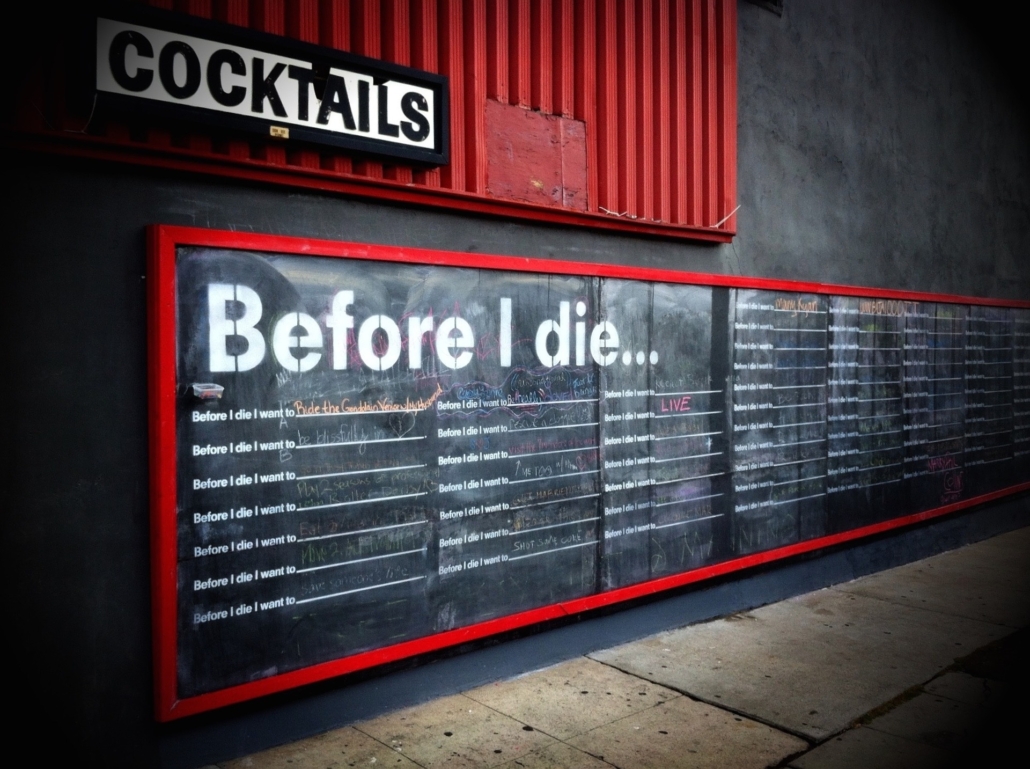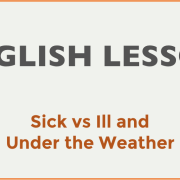In this English lesson, you’re going to learn 11 essential, everyday idioms.
Watch the video and/or read the article below.
Let’s go!
1. jump on the bandwagon
- Are you watching the England game tonight?
- You never watch football
- I know, but they might win the Euros
- Someone’s jumping on the bandwagon
This means, to start doing something because it’s becoming popular. Here are more examples:
- Many people are jumping on the crypto bandwagon – crypto has become popular and people are starting to buy it in bigger numbers
- We refused to get on the smartphone bandwagon for a number of years – life was simpler back then
Here are some ways to use other phrases with similar meanings:
- You’re only watching England because everyone else is
- We refused to get a smartphone even though everyone else had one
2. under the weather
- Are you coming to the party later?
- I can’t – Sarah’s under the weather so we both have to stay home
Under the weather means to feel unwell. It’s not too strong, however. For example, you wouldn’t use this if you’re really sick.
You can say both:
- I’m under the weather
- I’m feeling under the weather
Here are some similar phrases:
- I feel terrible today
- I’m coming down with something
- He’s sick so he can’t come to work
Here’s a conversation lesson on sick phrases:
3. Bucket list

- Guess, what…
- What?
- I’ve just won a free vacation to the Grand Canyon!
- Holy… that’s on my bucket list!
If someone has a bucket list, they have stated the achievements and experiences they want to have before they die.
- What trips are on your bucket list?
- I can cross going to the World Cup off my bucket list
Here are other ways to say this:
- Where have you always wanted to go?
- I went to the World Cup last year – it was something I had always wanted to do
4. get a second wind
- All right, let’s get to work
- You were exhausted a second ago
- I know, I got a second wind
This means to feel reenergized after feeling tired. It’s used a lot in sports:
- we need a second wind here – we look knackered
- that drink gave me a second wind
Here are alternative ways to say this:
- We need to get our energy back if we want to win this game
- That drink reenergized me!
5. No pain, no gain

- Come on, 6 more press ups, no pain, no gain
This means that you won’t achieve something unless you get uncomfortable and maybe go through some pain.
It’s used a lot in sport. When a team is training and people are getting tired, the coach might say “no pain, no gain”
This can be used for English learning too. Here’s a lesson I made on this:
Here’s a fun quote about this:
Hard work beats talent when talent doesn’t work hard
6. A blessing in disguise
- Did you hear about that company you applied for?
- What?
- They just went under
- Well, not getting that job was a blessing in disguise
If a business goes under – which is another idiom – then it means that they cease operating. The business is no more.
A blessing in disguise means that what you think was bad or misfortunate ends up having an advantage. Not getting that job wasn’t good at the time. But in the end, it was good because the company isn’t around any longer.
- Failing his exam was a blessing in disguise as he ended up doing work he loved
- Going the wrong way in Ecuador was a blessing in disguise as I met my wife
We can also use the phrasal verb turn out here:
- It all turned out great in the end as that company went under.
7. Get something off your chest
- So, I’ve been meaning to get something off my chest for a while
- Uh oh, go on…
- I don’t really like our dog
To get something off your chest means to tell someone about something that is making them unhappy or something that they’re not proud of
In the example, the person didn’t like their dog – weird, I know – and they had been keeping it to themself for a while. But finally, they got it off their chest, they shared this.
- You seem a little cold today, is there something you need to get off your chest?
- It feels so good to finally get that off my chest
Other ways to say this:
- Is there something you’d like to share?
- There’s something I’ve been meaning to tell you
8. So far, so good
- What are you watching?
- Game of Thrones
- How is it?
- So far so good
This means, up to this point in time, it’s good. Game of Thrones, until this point, is good.
- How’s the new deck coming along?
- There’s a lot more to do but so far so good.
Can use the present continuous here:
- It’s going well
- It’s going pretty well
If you want to use the opposite, and use some British understatement, you can say:
- Not the best
- How do you like Game of Thrones
- Well, it’s not the best
9 Get on nerves
- *annoying video*
- Will you turn that off, it’s getting on my nerves
- *Turns it up*
This means to annoy. Here are more examples:
- That guy over there is really getting on my nerves – the way…
- He used to get my nerves but he’s all right now
And here are other ways to say this:
- He’s ticking me off (American)
- He’s such a pain
- He’s really bugging me
10. Lighten Up
- That guy is annoying me….
- Will you lighten up – you’re annoying me now
This means to take things less seriously – not to be so emotional about something
- I was just kidding – lighten up
- I know, I need to lighten up a bit
Other ways to say this:
- Relax, I was just kidding
- Take it easy, I know he’s annoying but you’re getting a bit too angry
Here’s a great quote too:
Never in the history of chilling out has anyone chilled out after being asked to chill out.
11. Butterflies in stomach
- Are you ready for your speech?
- I’m a little nervous – actually, I have butterflies in my stomach
To have butterflies in your stomach means to feel nervous or anxious – more specifically, you can feel it in your stomach – like little butterflies are fluttering around in there.
- I can’t believe I’m nervous – I’ve actually got butterflies in my stomach
- Even Ronaldo might get butterflies in his stomach before taking a penalty (Sui)
Other ways to say this:
- I feel really anxious about my speech
- I’m really nervous – how can I calm down?
And if you want to talk about the opposite:
- Don’t worry, I’m cool, calm, and collected
- He doesn’t get nervous in these situations









